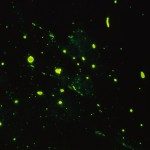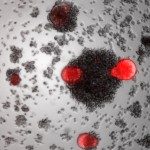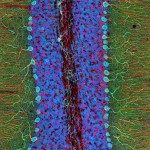Link to Pubmed [PMID] – 23271966
PLoS Pathog. 2012;8(12):e1003060
NF-κB transcription factors are crucial for many cellular processes. NF-κB is activated by viral infections to induce expression of antiviral cytokines. Here, we identified a novel member of the human NF-κB family, denoted RelAp43, the nucleotide sequence of which contains several exons as well as an intron of the RelA gene. RelAp43 is expressed in all cell lines and tissues tested and exhibits all the properties of a NF-κB protein. Although its sequence does not include a transactivation domain, identifying it as a class I member of the NF-κB family, it is able to potentiate RelA-mediated transactivation and stabilize dimers comprising p50. Furthermore, RelAp43 stimulates the expression of HIAP1, IRF1, and IFN-β – three genes involved in cell immunity against viral infection. It is also targeted by the matrix protein of lyssaviruses, the agents of rabies, resulting in an inhibition of the NF-κB pathway. Taken together, our data provide the description of a novel functional member of the NF-κB family, which plays a key role in the induction of anti-viral innate immune response.





